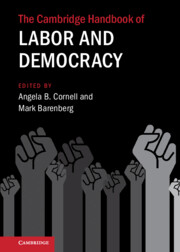Book contents
- The Cambridge Handbook of Labor and Democracy
- The Cambridge Handbook of Labor and Democracy
- Copyright page
- Contents
- Contributors
- Acknowledgments
- Introduction
- Part I Labor and Democracy: Theory and Practice
- Part II History, Politics, and Law
- Part III Labor, Diversity, and Democracy
- Part IV Country and Regional Perspectives
- Part V Labor and Democracy Sectoral Case Studies: Platform Workers, Higher Education, and the Care Industry
- 19 Pursuing Democratic Depth in an Age of Multinational Power and Soft Labor Law
- 20 Corporatization of Higher Education
- 21 The Fissured Welfare State
- Index
- References
19 - Pursuing Democratic Depth in an Age of Multinational Power and Soft Labor Law
The Case of Platform Worker Protests
from Part V - Labor and Democracy Sectoral Case Studies: Platform Workers, Higher Education, and the Care Industry
Published online by Cambridge University Press: 25 January 2022
- The Cambridge Handbook of Labor and Democracy
- The Cambridge Handbook of Labor and Democracy
- Copyright page
- Contents
- Contributors
- Acknowledgments
- Introduction
- Part I Labor and Democracy: Theory and Practice
- Part II History, Politics, and Law
- Part III Labor, Diversity, and Democracy
- Part IV Country and Regional Perspectives
- Part V Labor and Democracy Sectoral Case Studies: Platform Workers, Higher Education, and the Care Industry
- 19 Pursuing Democratic Depth in an Age of Multinational Power and Soft Labor Law
- 20 Corporatization of Higher Education
- 21 The Fissured Welfare State
- Index
- References
Summary
In recent decades the contribution of collective labor law as a core element of social democracy has been questioned. The existing institutional pathways that deepen democracy have eroded, for labor organizations and the workers represented by them. Unions and workers have reoriented their strategies in order to recover spaces of participation and influence – deeply shaping democratic outcomes through new types of mobilization. The case of platform workers’ mobilization is an emblematic example of local strategies in the face of global problems. New types of mobilization by new actors have reaffirmed labor’s ability to foster democracy’s depth despite the erosion of older institutional channels supportive of that same end.
- Type
- Chapter
- Information
- The Cambridge Handbook of Labor and Democracy , pp. 307 - 317Publisher: Cambridge University PressPrint publication year: 2022

